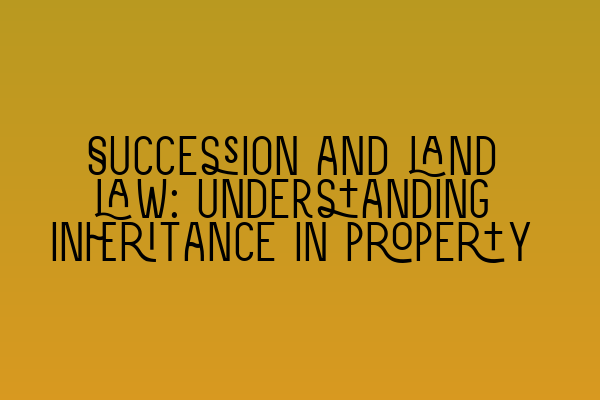Succession and Land Law: Understanding Inheritance in Property
When it comes to property law, one important area to understand is succession and inheritance. With the passing of a loved one, the question of who inherits their property and assets inevitably arises. In this blog post, we will explore the intricacies of succession and how it relates to land law.
What is Succession?
Succession refers to the transfer of property rights from one person to another upon their death. This transfer can occur through a variety of mechanisms, including wills, intestacy laws, and trusts. The laws governing succession vary depending on the jurisdiction, so it is crucial to consult a legal professional to navigate the complexities specific to your region.
Before we dive into the specifics of succession and land law, it’s important to understand the different ways in which property can be owned.
Types of Land Ownership
Land can be owned in various forms, including:
- Freehold: This is the most straightforward form of ownership, where the owner has full, unconditional control over the property.
- Leasehold: In this arrangement, the owner has the right to occupy and use the property for a set period, but the ultimate ownership remains with the landlord.
- Joint Tenancy: This form of ownership is typically used by married couples. In joint tenancy, each party has an equal right to the property, and if one owner passes away, their share automatically passes to the surviving owner(s).
- Tenancy in Common: Unlike joint tenancy, tenancy in common allows for unequal ownership shares. In the event of death, the deceased’s share will pass according to their will or the intestacy laws.
Now that we have a basic understanding of land ownership, let’s explore how succession comes into play.
Succession and Intestacy
In the absence of a valid will, the laws of intestacy govern the division of an individual’s estate. Intestacy laws provide a framework for distributing property when there is no explicit direction from the deceased. These laws typically prioritize close family members such as spouses, children, and parents.
It’s important to note that intestacy laws differ between jurisdictions, so it’s crucial to consult a legal professional to understand the specific rules applicable to your situation.
Wills and Succession
Creating a will is one of the most effective ways to ensure that your property is distributed according to your wishes after your passing. A will allows you to specify who you would like to inherit your property, assets, and possessions. It also provides an opportunity to name an executor who will oversee the distribution of your estate.
When creating a will, it’s crucial to seek legal advice to ensure that your document meets all the legal requirements of your jurisdiction. Legal challenges in property transactions can arise when wills are not properly executed, leading to disputes and potential delays in the distribution of assets. This comprehensive guide on legal challenges in property transactions provides additional information on this topic.
Trusts and Succession
Trusts offer a flexible and effective way to manage the transfer of property upon death. By establishing a trust, you can place your property under the control of a trustee who will manage it for the benefit of designated beneficiaries.
Trusts can be particularly useful in cases where there are complex family dynamics, minors, or individuals with special needs involved. They allow for greater control over the distribution of assets and can provide protection against potential challenges to your estate.
Seeking Professional Advice
Given the complexity and importance of succession and land law, it is strongly recommended to seek professional legal advice. A knowledgeable solicitor can guide you through the process, ensuring that your wishes are upheld and that your loved ones are provided for.
Understanding the intricacies of succession and inheritance in property is essential for anyone involved in the buying or selling of real estate. By familiarizing yourself with these concepts, you can better protect your rights and make informed decisions throughout the process.
For more guidance on property law, be sure to check out these related articles:
- Legal challenges in property transactions: A comprehensive guide
- Dominate Property Law Questions: Avoiding Common Pitfalls
- Land Law Revision Tips: Ace Your Exam Preparation
- Environmental Ethics in Land Law: Balancing Development and Sustainability
- SQE case studies in property law: Real-world scenarios
Remember, knowledge is power, and understanding property law is essential for ensuring the smooth transfer of assets and the protection of your rights.
